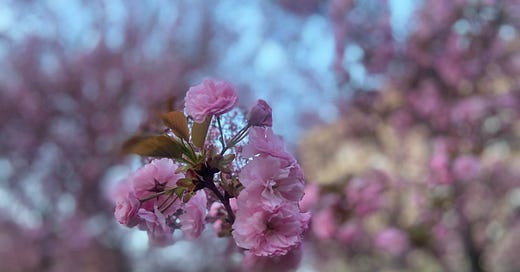Good morning, lovely humans. From my perch in NY, I’m watching the papal funeral motorcade wind its way through Rome to Francis’s final resting place of St. Maria Maggiore. “Even if you weren’t a Catholic, Pope Francis carried a message of love and peace to the very end,” the ABC reporter just remarked, reminding me of Naomi Klein’s 2015 New Yorker article in which she marvels that a “secular, Jewish feminist” was invited to speak at the Vatican, and notes her appreciation of Francis’s economic-ecosocial critiques.
It’s been quite a ride these 12 years. From where I sit in a theology department at a Jesuit university, it has been an opportunity to observe, explain, and critically engage Pope Francis’s written, spoken, and enacted frameworks for diagnosing and responding to the interlocking perils of our time, especially in Laudato Si’ (2015). As I have written elsewhere, LS is not a perfect document — my second single-authored book, Beyond Laudato Si’, comes out in May 2026 and is a sustained, anti-colonial intersectional feminist analysis of that document, including critiques both intense and constructive. But like Laudato Si, Pope Francis’s legacy is an important, even vital one. He was the first pope to address an encyclical to “every person living on the planet.” He diagnosed climate change as anthropogenic, insisted that it was derived from both structural extractive-economic causes and human excess, and he constantly demonstrated the importance of being a church that is oriented to the margins — protecting migrants and refugees, caring for the earth, advocating for economic equity, and exhorting political leaders to the importance of peace, not war.
Remarking on the throngs of non-Catholics lining the motorcade route just now, another ABC reporter observed: “With all that’s going on in the world right now, it doesn’t matter if you’re Catholic or not — people [resonate with the message of] embracing one another instead of pushing one another away.” He “transcended the institution [he] was supposed to represent,” agreed another.
Yesterday in my “Faith and Critical Reason” intro classes (70 students) we talked about the way that media attention in the U.S. over the past five days— even in the varied, rapid mediascapes of 19 year olds — has consistently attuned to Pope Francis’s death, funeral, and the coming conclave. Given the onslaught of other news items at present (often about degrading, cruel, and whimsical political acts OR completely vapid consumer content), and given the diversity of content creators, I asked students to reflect on what counts as a moral voice in the present day. Whose vision and perception, whose moral articulations, does one trust? Are there people whose life and work resonate beyond the parameters of cultures of domination, and the social-political-economic trends undergirding them? Pope Francis seems to have been one, I said. Thich Nhat Hanh — whom we studied and discussed a few weeks ago — was another.
All knowledge is situated, all viewpoints partial and incomplete. But some are more generous, cognizant of complexity, and inclusive than others. So, I said to students, Who speaks beyond and outside of paradigms of cultural normalization? Who helps you see what you had not quite seen before? Who is morally trustworthy, and why? Carry these questions beyond this semester. And so, friends and readers, I offer those questions to you, too, for this extraordinary world and precedented but also not-so-ordinary time.
If you’d like to reflect on the ecological theology-ethics of Pope Francis, here is a smattering of my public-facing work: “For Catholics, a new kind of Pro-Creation” (Washington Post, 2013) // “A Planetary Pope” (America 2015) // “What you need to know about Pope Francis’s environmental encyclical” (Washington Post, 2015) // “Pope Francis and the fourth era of the Catholic Church’s engagement with science” (Bulletin of the Atomic Scientists, 2015) // “Pope Francis and the Climate: Laudato Si’” (Living on Earth [podcast], 2015) “The Order of Nature? Integral Ecology and Natural Law” (Georgetown University’s Berkley Forum, 2020) // “Pope Francis, Climate Activist?” (NPR feature by Scott Detrow, 2023) // “Pope Francis focused on climate change as the planet continued to get hotter” (NPR feature by Jeff Brady, 2025) // “The Life and Legacy of Pope Francis: Obituary” (PRI feature by Matthew Bell, 2025).
Friend and colleague Meghan Clark has done excellent commentary on Pope Francis’s overall legacy: check out her interview with Bloomberg News (Monday, April 21, 2025).
Looking ahead
As academic year 2024-2025 winds to a close and spring finally lilts into New York, there is so much to write about: time in Kitchener/Waterloo with Andre last weekend — yes, the French New Wave costumes!, and also our remarkable Food-and-NapQuest Saturday that “put the ‘kitchen’ in Kitchener.” A thought-provoking conference on water (remotely) on Monday, “Sacred Waters of the World.” A truth-telling, enheartening panel featuring Indigenous women climate activists and ecological protectors, and a release of a policy brief by WECAN International alongside the UN events of the week. But these will wait, for now.
As the cherry blossoms magically arch toward one another and waft bursts of pink on the April wind, may you find the gentle-extraordinary in the ordinary, friends. Have courage. Be kind. I’ll see you in two weeks. ~ CNZ






